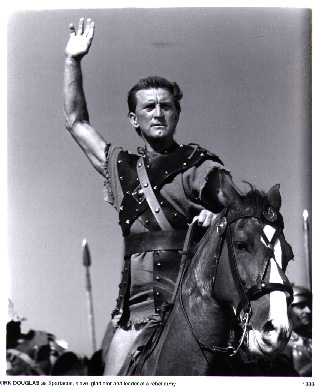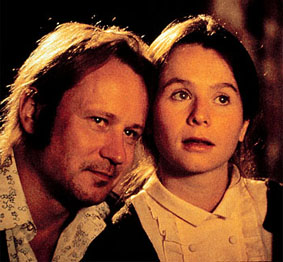Artists I've Been Listening To...
First off, the North American trailer for Wong Kar-Wai's 2046 is now available here. It looks great, and really captures the feeling of the film. I suppose I'd be inherently partial to it because it focuses so much on the stuff from the future sections of the film, which I'd consider to be the best thing WKW has ever done.
The film drops on August 5, but I already have the DVD. However, I will be seeing it in the theater very soon. On June 15, Wong Kar-Wai is appearing and doing a Q&A at a screening of the film at Lincoln Center. I've never seen a WKW film in the theater, and 2046 is a really astonishing visual experience, so that alone is worth it, but it's also WKW live. I always like to meet film people and hear them talk about the process, especially if they are total storytellers. While Martin Scorsese may have made some great films, he doesn't usually make the stories himself, so you can't get a sense of his whole process, whereas with WKW or Joss, they do everything, and are a lot more interesting to talk to. In the past few years, I've met a lot of my idols, and this is another one to add to the list. I'd still really like to meet Alan Moore and Grant Morrison, though that's not likely to happen unless I make it over to the UK.
So, that should be very cool. Now I'm going to quickly go over some of the music I've been listening to lately because I've definitely been branching off in some different directions.
Electric Light Orchestra - I've been listening to a lot of the Electric Light Orchestra, a band from the 70s that is most famous for their songs "Mr. Blue Sky" and "Evil Woman." When I was very young I remember hearing "Evil Woman" on some Disney special, over a montage of their villains, but I could never remember what the song was. This was when I lived in my old house before 1990, I don't know how I could have remembered this for so long, but last year I heard the song in Mocon and it came back to me. The song had remained with me for 15 years, it's a great song, but even so I found that pretty strange.
Anyway, I grabbed the song and some of their other stuff, but only started listening to the albums recently. I've been listening to a lot of A New World Record and Out of the Blue, both great albums, though I prefer Record. Electric Light Orchestra is an ancestor of a lot of the current artists I love most. Perhaps the best description of the band I could give would be a combination of Daft Punk and The Polyphonic Spree, probably my two favorite current artists, so ELO is understandably a favorite of mine. From Daft Punk they drew a synth based, quasi-dance sound, with frequent use of vocoder, the Electric part. From The Spree they draw the frequent use of big orchestration, with a ton of different instruments at work, the orchestra part. On their best songs, they rock hard, while sounding unlike any other band around.
Their most bizarre song is "Mission," about some aliens who come to earth. It's all over the place, and has the sort of over the top hyperbole that only 70s rock can provide. If you recall "Stonehenge" from Spinal Tap, this is the sort of song that was parodying. Definitely worth checking out. Other standout tracks are the really rocking "Do Ya" and "Livin' Thing," as well as the more subdued "Summer and Lightning" and "Turn to Stone."
Annie - Annie is a relatively new artist, who has put out just one album, Anniemal, which actually hasn't even been released here. Said album is awesome, an amazing pop confection, where pretty much every song is catchy, solid listening. She hails from Iceland, and has more electronic based production than your average album made here. I love the electronic stuff found in much of Europop, and this is one of the best examples of it. Her voice isn't that great, but woven into the music, it's phenomenal.
Her best song is "Heartbeat," which uses a pounding drum over the chorus to simulate her heartbeat as she gets to know someone over the course of a night. I love driving repeated riffs in a song, and the hearbeat drumming just propels the song forward. I think pop has gotten a bad name, and the perception is that albums that sound like this are just "commercial," while darker, less instantly accessible albums must be more artistically relevant. However, music is ultimately about sound, and this album just sounds great all the way through, perfectly constructed pop.
Belle and Sebastian - I really liked their soundtrack for the movie Storytelling and I finally caught up with their albums. So far, I've heard If you're Feeling Sinister and The Boy with the Arab Strap. I really like their sound, it's got a lot of varied instruments and similar to The Smiths, an interesting mix of heavy subject matter and light music. It's really pleasant sounding music, with a bit of 60s flavor. Their best tracks are "Stars of Track and Field" and "Like Dylan in the Movies."
Rachael Yamagata - She's another fairly new artist, with only one album to her credit, Happenstance, and it's a great album. Yamagata reminds me a bit of Aimee Mann in that she is a singer/songwriter, but places a lot of emphasis on the backing tracks and overall production. Too many singer/songwriters focus only on the lyrics, but her tracks are fully realized songs. She rocks pretty hard, and has a great range of darker stuff, like "Under My Skin," and light, poppy tunes, like "1963."
She does a great job of writing lyrics that sound good when sung. "Be Be Your Love" has a great chorus that might not read well, but sounds great in the context of the song. Similarly, "I'm loving you like it's 1963" paints a picture of the world the song is trying to evoke and sounds great as a chorus. While I do love Aimee Mann, her songs are rather similar, while these have great variety, both in terms of music and in terms of theme and atmosphere they are trying to evoke.









